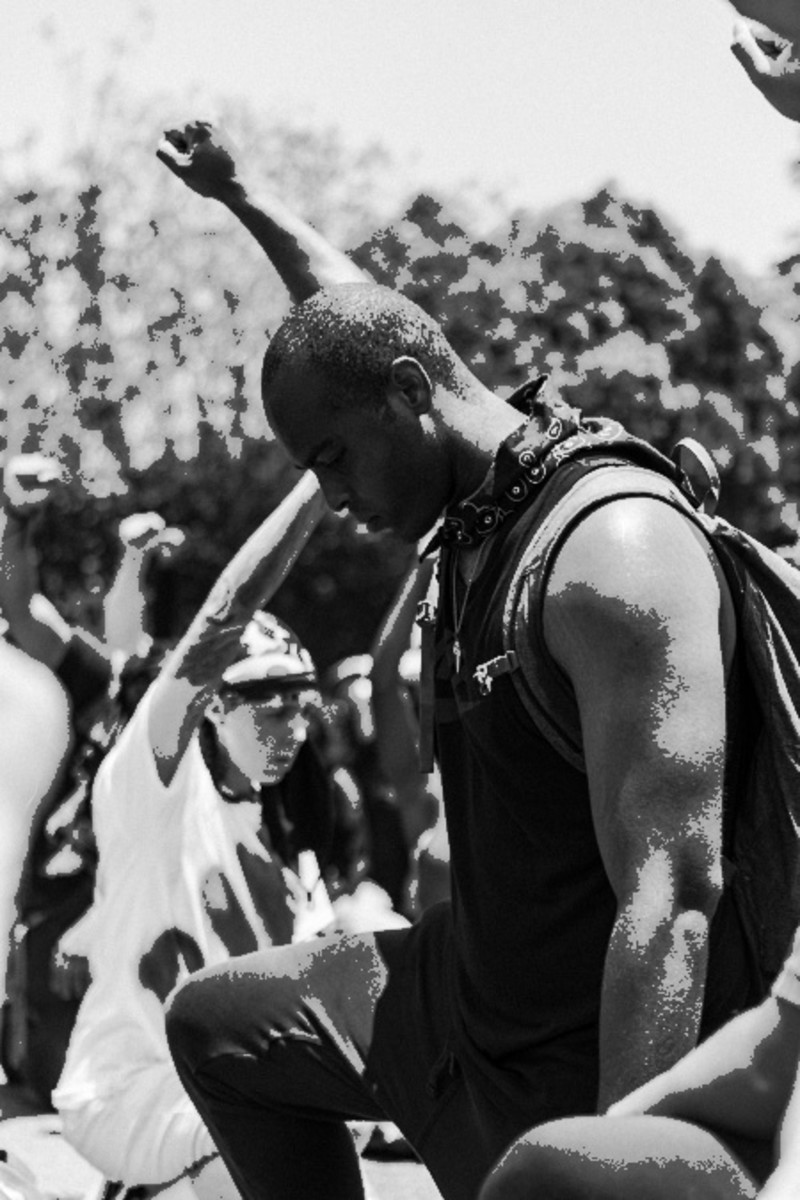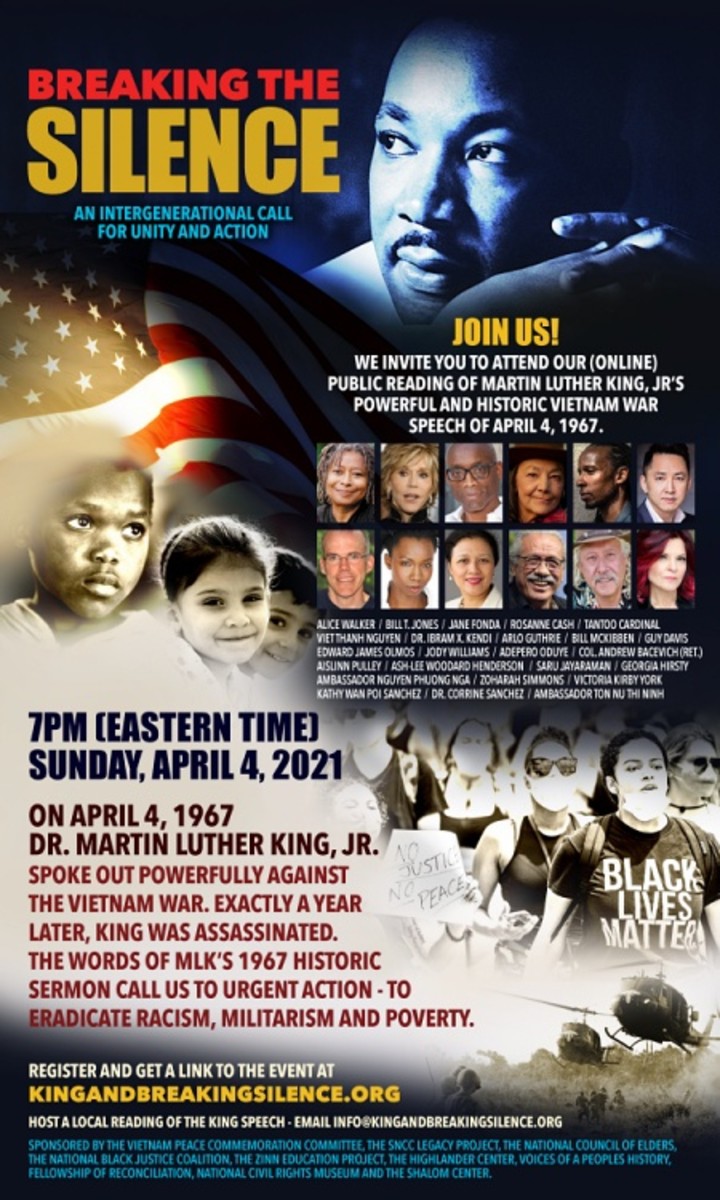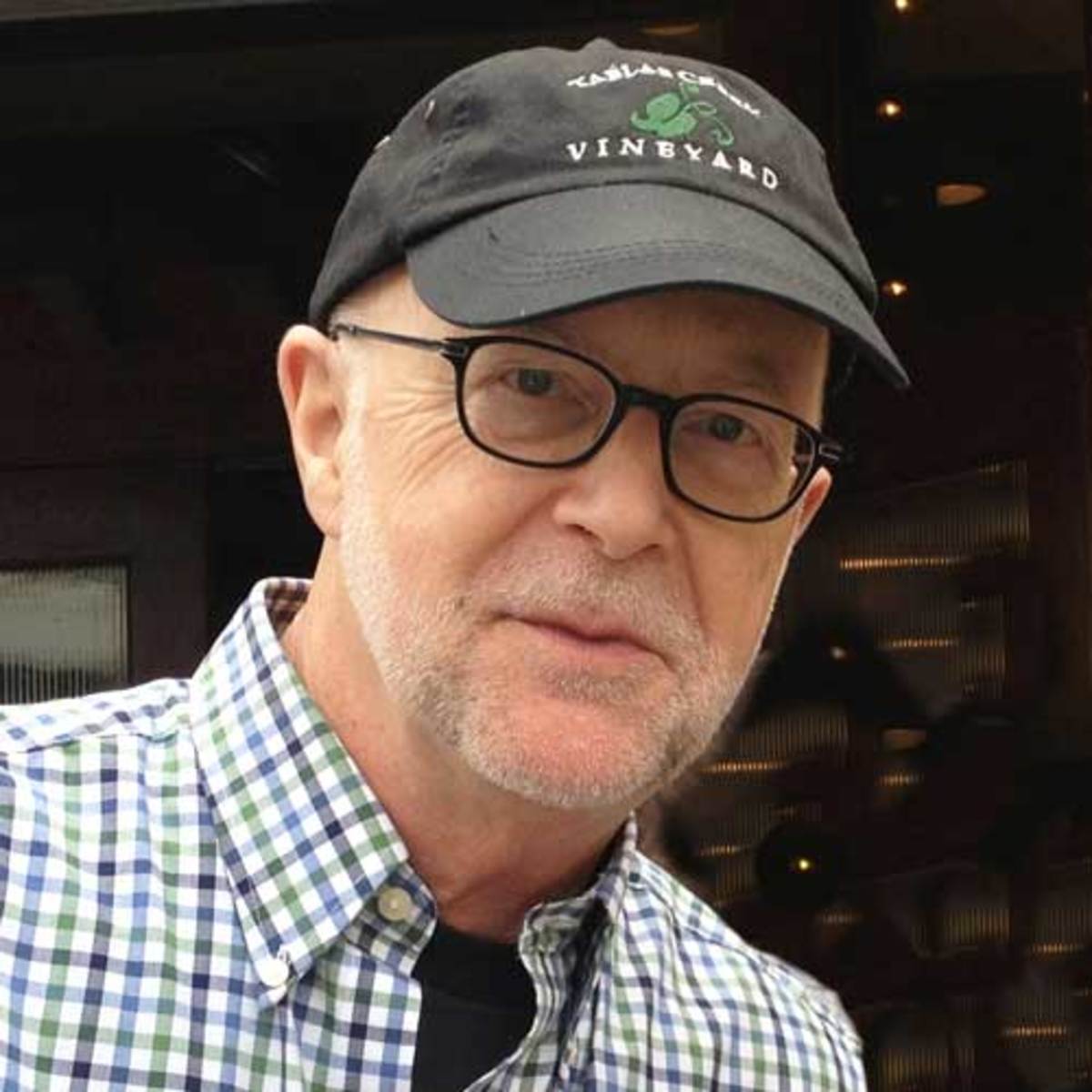The Left’s Challenge Today: The Radical Martin Luther King, Jr.

Adream shared by many will finally come to fruition Sunday night when the April 4 anniversary of Dr. King’s murder serves as a springboard for reflection on King’s radical vision for a transformed America. For purposes of the launch, it helps that Sunday also happens to be Easter and the last night of Passover: sacred days that still signify revolutionary hope. Over thirty national faith leaders have signed a statement of support for the project; some of these leaders, like Rev. James M. Lawson, Jr., were close collaborators with King during his lifetime.
What’s called the April 4 Project represents a “beloved community” collaboration among the National Council of Elders, the National Black Justice Coalition, and a host of other justice-oriented organizations. Due to ongoing Covid concerns the event will take place in the form of a webinar, during which a celebrity cast of readers (among them Jane Fonda, Viet Thanh Nguyen, Ibram X. Kendi, Andrew Bacevich, and Bill T. Jones) will present King’s 1967 speech at The Riverside Church—”Beyond Vietnam: A Time to Break Silence.” Afterward, a panel featuring Bill McKibben, Medea Benjamin, Ash-Lee Henderson, and Corrine Sanchez will discuss the significance of King’s vision for the current moment.
King’s speech, given to a packed Riverside Church exactly one year before he was killed in Memphis, is notorious for the way it provoked fury, condemnation and distress at the time. Fury from the Johnson Administration and its pro-war supporters; blistering condemnation in the mainstream media; and acute distress among many of King’s allies who felt that he was sacrificing domestic civil rights goals on the altar of the antiwar cause.
Given how the practice of radical nonviolence implies a willingness to sacrifice, how much are you personally willing to sacrifice for the achievement of the long-awaited radical revolution of values?
Written in large part by the late Vincent Harding, Jr.—a legendary figure in his own right—the speech builds quietly until it rises to a mighty coda. King begins by describing his calling to speak out as a “vocation of agony,” signaling that he knows this speech will be inflammatory and does not take lightly what he considers to be his prophetic duty. He says that he approaches his task with humility and acknowledges how all of us operate with limited vision. He makes it clear that he is addressing “my beloved nation” as a patriot and not as a mouthpiece for either North Vietnam or the National Liberation Front (“Viet Cong”)—entities which he does not regard as “paragons of virtue.”
Then King proceeds to make the antiwar case with unparalleled clarity, citing the reasons he’s calling for the slaughter in Southeast Asia to end:
- The war has eviscerated domestic anti-poverty efforts; war is always “the enemy of the poor.”
- War punishes the poor in a second way by sending the poorest to do the fighting and dying; King is scandalized that the United States finds it possible to make poor whites and poor Blacks fight and kill Asians together but won’t allow them to be schooled together here at home.
- War’s organized lethal violence represents a defeat for the wider cause of nonviolence—and here is where King enraged liberals and conservatives alike by calling the U.S. “the greatest purveyor of violence in the world.”

- King must and will remain true to his faith in Jesus Christ as a peacemaker and reconciler.
- People of genuine faith have loyalties that transcend nationalism: the idea that all are brothers and sisters, created equal under one God, cannot just be some empty slogan that has no application in the real world.
- The true meaning and value of nonviolence is how it “helps us to see the enemy’s point of view.”
The last point opens to the part of the speech I’d forgotten but that came back with tremendous force upon re-reading: a very long section detailing the utter corruption of the U.S. “cause” in Southeast Asia: this country’s nine years of covert support for French recolonization efforts, its failure to recognize the Vietnamese determination to be independent from China, its abhorrent marching of Vietnamese women and children into concentration camps (the U.S. military called these “strategic hamlets”), and its indiscriminate use of napalm and Agent Orange to lay waste to the land and its people, killing millions of noncombatants in three countries (Vietnam, Laos, and Cambodia).
King broadens his critique of this war into a sobering look at how a country—ours—that once claimed to stand for revolutionary ideals became the ally of dictators and tyrants and counterrevolutionary forces everywhere. He cites examples of U.S.-sponsored counterinsurgency: Venezuela, Guatemala, Peru, South Africa, Mozambique.
Once he has placed the United States squarely “on the wrong side of the world revolution,” King delivers the gut punch—the part of the speech everyone remembers if they remember it at all:
I am convinced that if we are to get on the right side of the world revolution, we as a nation must undergo a radical revolution of values. We must rapidly begin the shift from a thing-oriented society to a person-oriented society. When machines and computers, profit motives and property rights, are considered more important than people, the giant triplets of racism, extreme materialism, and militarism are incapable of being conquered…
America, the richest and most powerful nation in the world, can well lead the way in this revolution of values. There is nothing except a tragic death wish to prevent us from reordering our priorities so that the pursuit of peace will take precedence over the pursuit of war. There is nothing to keep us from molding a recalcitrant status quo with bruised hands until we have fashioned it into a brotherhood.
And these haunting words—haunted by our knowledge that the Second Indochina War would grind on for eight more excruciating years:
We are now faced with the fact, my friends, that tomorrow is today. We are confronted with the fierce urgency of now. In this unfolding conundrum of life and history, there is such a thing as being too late.
Hard questions for today
Reading “Beyond Vietnam” today stirs up deep memories and raises difficult questions for me. I was just cutting my activist teeth in 1967, and I wondered then—as I do now—about my vocation and our vocation as seekers of justice and peace.
Today, as then, the Left is divided between so-called “centrists” (ignoring how far to the right the center has moved) and those who claim a radical perspective. Both camps want to be considered “progressive,” but the centrists deride the radicals as delusionary and naive about how politics work, whereas the radicals dismiss the centrists as sellouts to the corporate agenda and as uncritical champions of American exceptionalism. The presidency of Joe Biden—a centrist politician par excellence—brings these fissures to the fore and creates irresistible catnip for the chattering classes.
I will always identify proudly with the radical camp. I don’t think there can be any compromise with white supremacy or entrenched corporate power. But I do still wonder whether my side is really as radical as it claims to be. I worry about performative wokeness and virtue signaling and the kind of celebrity activism that these days is often fueled by Hollywood and hedge fund money (in some ways reenacting the much-derided radical chic of the 1960s).
It’s painful to have to say it, and in no way do I intend to give aid and comfort to the howling hyenas of the Right who now focus their attacks on Critical Race Theory, but representation by itself can never substitute for reparation, let alone revolution. All of the elite institutions that are striving for diversity and inclusion will not disturb the peace of the Corporate State in the slightest degree. A more diverse elite is still an elite. There’s even a name for what we see emerging now (and an illuminating new book about it): identity capitalism. King long ago recognized this trap; he said he feared “integrating my people into a burning house.”
To be clear, I have no doubt that if he were here today, Dr. King would celebrate the way in which race and the toxic legacy of white supremacy have been moved front and center in the national conversation. But I also think he might have hard questions for us oldsters who are still trying to fight the good fight as well as for the young woke ones.
Among those questions:
- How serious are you about building power—about using the political levers that remain the primary means for changing things—while also practicing radical nonviolence and exercising message discipline? Put another way, what’s your strategy (because your enemies definitely have one)?
- How prepared are you to challenge the still-standing structure of American imperialism—the enormous military and “intelligence” footprint of this country—which is just as much an expression of white supremacy as is domestic police terrorism and anti-Black repression? (It would surely strike King as odd that the cost of maintaining this footprint hardly enters into today’s political conversation and that nearly everyone seems to be more or less okay with dropping $6.4 trillion—and killing at least 800,000 people—in an ineffective and counterproductive “war on terror.” When will we understand that defunding the police and defunding the Pentagon reflect one and the same struggle?)
- Finally, given how the practice of radical nonviolence implies a willingness to sacrifice, how much are you personally willing to sacrifice for the achievement of the long-awaited radical revolution of values?
This last question is clearly the hardest to answer. King himself was spiritually prepared all his life to make the ultimate sacrifice. Not all of us need to go to that limit, but all of us do need to ask ourselves whether we really believe there can be fundamental transformation without sacrifice. For me, and especially during this Easter week, the answer is obvious.
Peter Laarman
Religion Dispatches

No comments:
Post a Comment